Jennifer Aniston’s career in Hollywood is a testament to her enduring appeal and exceptional talent as an actress. Beginning her journey in the entertainment industry during the early 1990s, Aniston quickly rose to fame with her role as Rachel Green on the iconic television sitcom “Friends.” This role not only made her a household name but also showcased her natural charisma and comedic timing, endearing her to millions of viewers worldwide.
However, Jennifer Aniston’s ambitions and talents extended far beyond the confines of television comedy. Her transition to the film industry was marked by a series of roles that demonstrated her range and versatility as an actress.
Aniston’s foray into films was met with great anticipation and curiosity. Audiences who had grown to love her as Rachel Green were eager to see how she would navigate the broader and often more complex landscape of cinema. Aniston did not disappoint.
Over the years, she has taken on roles in a variety of genres, from heartwarming romantic comedies to intense dramas, proving her ability to adapt and thrive in different storytelling environments. This versatility is not just a testament to her skill as an actress but also to her dedication to her craft. She has consistently chosen roles that challenge her, pushing the boundaries of her acting abilities and allowing her to grow and evolve with each new project.
The top 10 movies of Jennifer Aniston’s career, which we explore in this article, offer a glimpse into the breadth of her talent. Each film represents a milestone in her career, marking her growth as an actress and her impact on the film industry.
Through these roles, Aniston has brought to life a diverse array of characters, each with their own unique stories and emotional landscapes. Her performances are characterized by depth and authenticity, bringing a sense of realism to even the most fantastical of narratives. This ability to connect with her characters on a deep level and convey their emotions to the audience is what sets Aniston apart as an actress.
Furthermore, the cultural impact of these films cannot be overstated. Through her work, Aniston has touched on various themes and issues, from the complexities of modern relationships to the struggles of personal growth and self-discovery.
Her films have not only entertained audiences but also prompted them to reflect on their own lives and the world around them. This blend of entertainment and introspection is a hallmark of Aniston’s career, making her films not just enjoyable viewing experiences but also meaningful contributions to contemporary cinema.
Jennifer Aniston‘s journey from the small screen to her status as a mainstay in the film industry is a reflection of her evolution as an actress. With each role, she has explored new facets of the human experience, bringing empathy, humor, and insight to her portrayals.
Her enduring talent and versatility have solidified her place in the hearts of audiences and the annals of Hollywood history. As we delve into the top 10 movies of her career, it becomes evident that Jennifer Aniston is not just a star but a true artist whose contributions to cinema will be cherished for generations to come.
1. The Good Girl (2002)
Plot and Character Development
“The Good Girl” stands out as a pivotal film in Jennifer Aniston‘s career, marking a significant departure from her previous, more lighthearted roles. In this dark comedy-drama, Aniston portrays Justine Last, a disenchanted retail worker who seeks an escape from her mundane life through an affair with a younger coworker. The complexity of Justine’s character allowed Aniston to explore deeper emotional depths, showcasing her ability to handle more serious and nuanced roles.
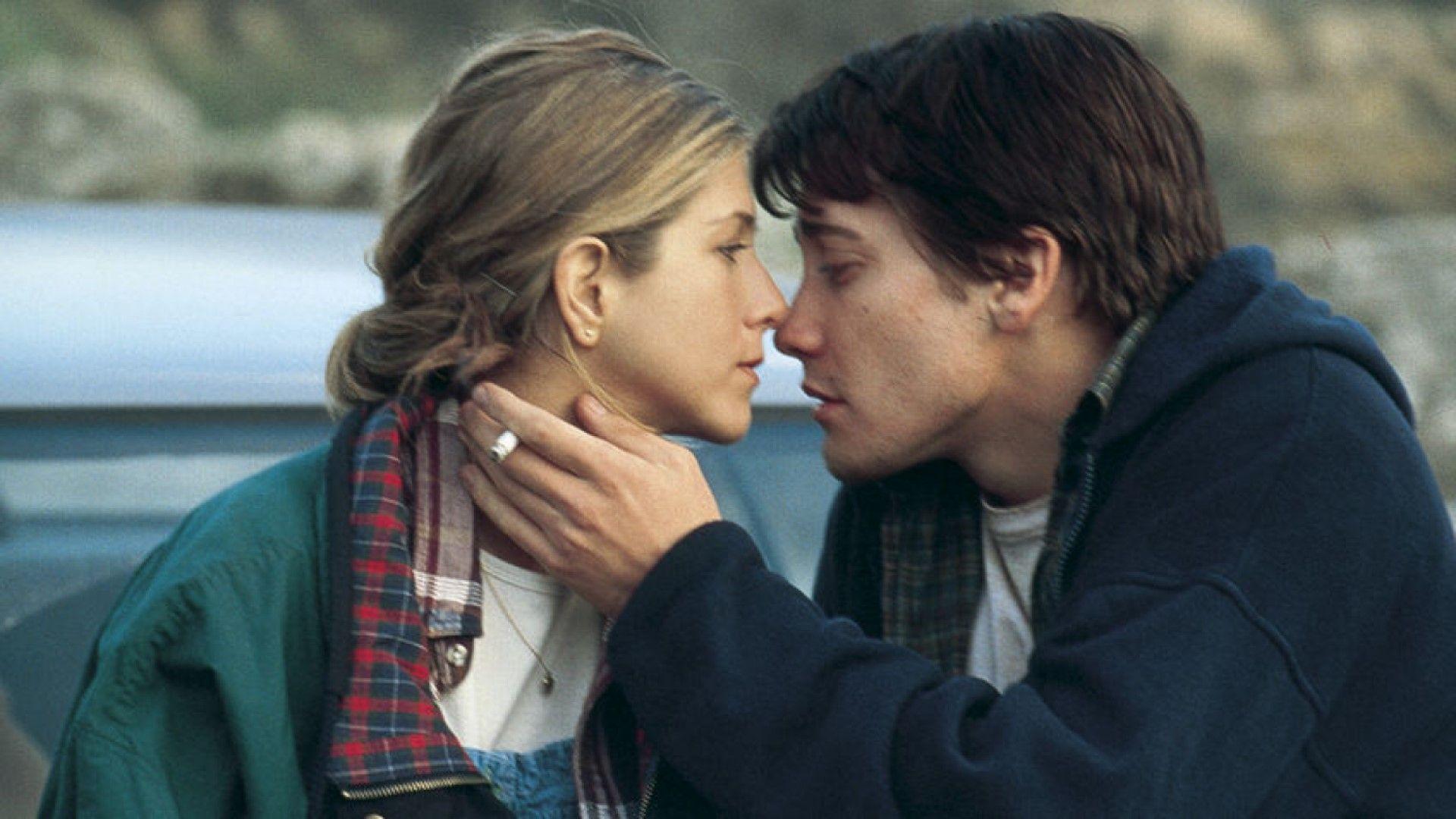
Thematic Elements and Performance
The film delves into themes of disillusionment, the search for identity, and the consequences of escapism. Aniston’s performance was lauded for its authenticity and emotional resonance, proving her capacity to engage with more complex material. Critics noted her ability to convey the internal struggle of her character, earning her praise and several award nominations.
Cultural Impact and Critical Reception
“The Good Girl” was a critical success, highlighting Aniston’s versatility as an actress and challenging the typecast role of the girl-next-door. It allowed audiences and critics alike to view her in a new light, paving the way for more diverse roles in her career.

Comparison and Evolution
Comparing this role to her earlier work in “Friends,” it’s evident that Aniston sought to diversify her acting portfolio, demonstrating her range and dedication to her craft. This film was a key moment in her evolution as an actress, showcasing her ability to transcend her comedic roots and embrace more dramatic and complex characters.
2. Cake (2014)
Plot and Character Development
In “Cake,” Jennifer Aniston delivers a raw and powerful performance as Claire Bennett, a woman grappling with chronic pain, loss, and addiction. The film provides a stark portrayal of grief and the human condition, with Aniston’s character at the forefront of this exploration. Her portrayal of Claire’s physical and emotional journey is both compelling and heart-wrenching, offering viewers a glimpse into the struggles faced by those living with chronic pain.
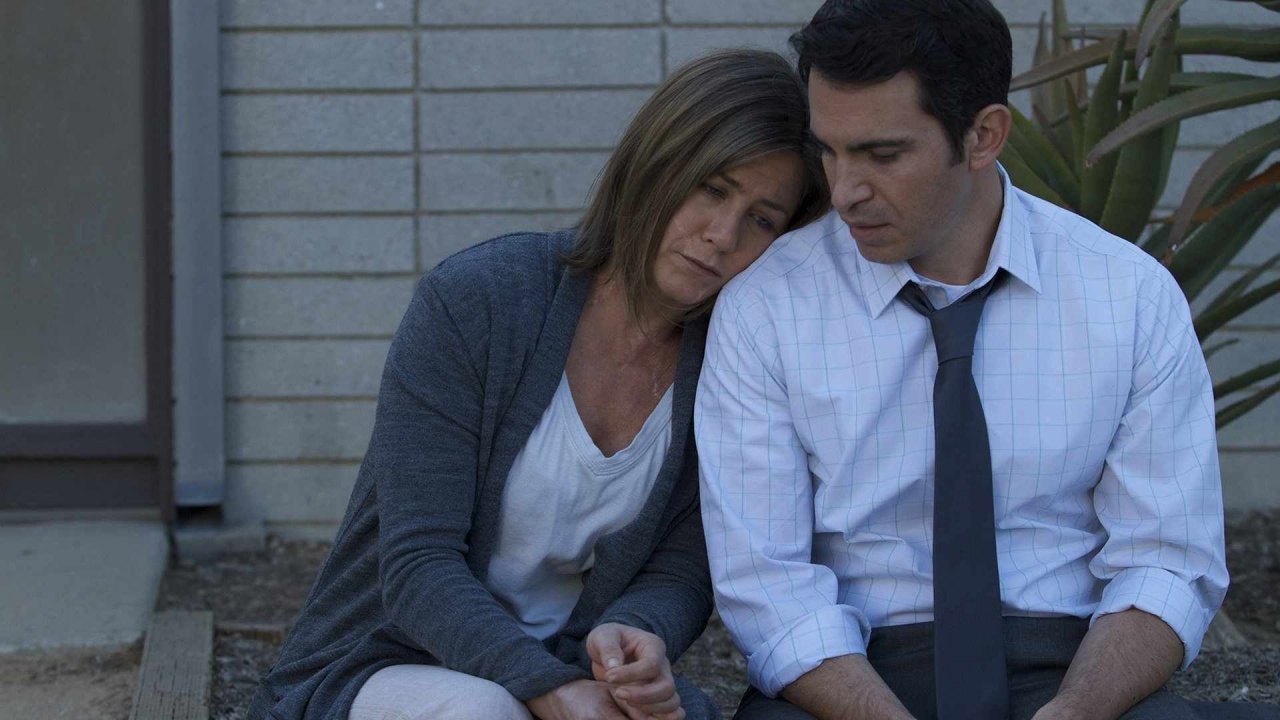
Thematic Elements and Performance
“Cake” addresses themes of grief, redemption, and the struggle for acceptance, both from oneself and from society. Aniston’s transformation for the role—both physically and emotionally—garnered critical acclaim, showcasing her dedication to her craft and her ability to convey deep, complex emotions. Her performance was praised for its honesty and depth, earning her nominations for several awards.
Cultural Impact and Critical Reception
The film sparked conversations about chronic pain and mental health, areas often stigmatized or overlooked in mainstream media. Aniston’s portrayal of Claire Bennett brought attention to these issues, contributing to a broader discussion on the topic. “Cake” further established Aniston as a formidable actress capable of tackling challenging and diverse roles.

Comparison and Evolution
“Cake” represents another significant milestone in Aniston’s career, demonstrating her commitment to challenging herself and exploring the depths of her acting abilities. Compared to her role in “The Good Girl,” “Cake” required Aniston to delve even deeper into the psyche of her character, further solidifying her status as a versatile and skilled actress.
3. Marley & Me (2008)
Plot and Character Development
“Marley & Me” features Jennifer Aniston alongside Owen Wilson, telling the heartwarming and often poignant story of a couple and their life with Marley, a lovable but naughty Labrador retriever. Aniston’s portrayal of Jenny Grogan navigates the complexities of love, marriage, parenthood, and loss, resonating deeply with audiences around the world. Her chemistry with Wilson and her genuine affection for Marley brings a sense of authenticity and warmth to the film.
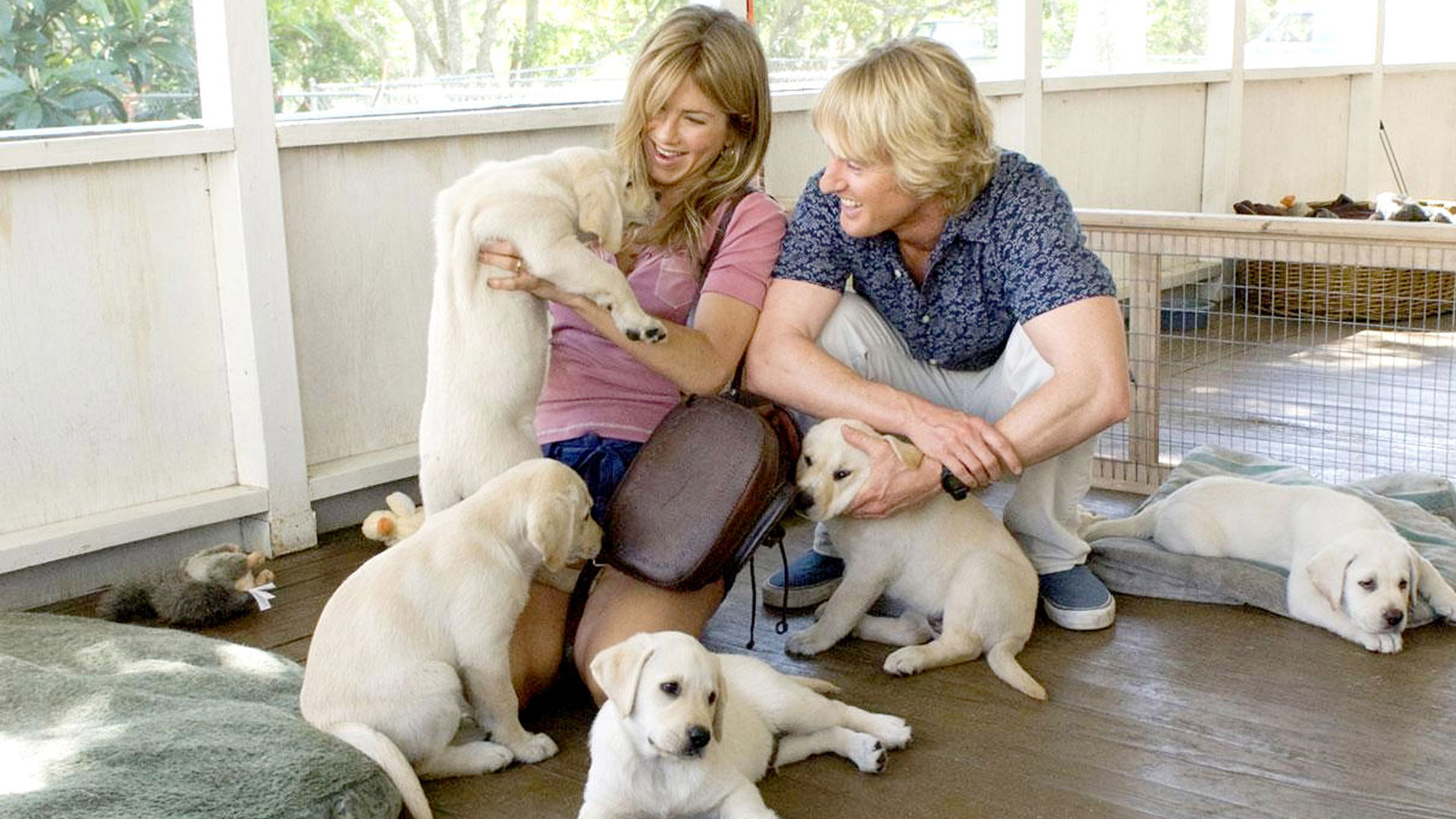
Thematic Elements and Performance
The film explores themes of family, commitment, and the inevitable passage of time, using Marley’s life as a backdrop to examine the joys and challenges of human relationships. Aniston’s performance was praised for its sincerity and emotional depth, capturing the nuances of her character’s journey through life’s ups and downs.
Cultural Impact and Critical Reception
“Marley & Me” struck a chord with viewers, becoming a significant commercial success and a beloved family film. It underscored the universal bond between humans and their pets, highlighting the unconditional love and lessons they bring into our lives. The film also showcased Aniston’s ability to connect with audiences in more personal and relatable roles, further cementing her status as a versatile actress.

Comparison and Evolution
Comparing “Marley & Me” to “The Good Girl” and “Cake,” we see Aniston’s range in portraying complex emotional narratives, whether through dark comedy, drama, or family-oriented stories. Her role in “Marley & Me” demonstrates her adaptability and her capacity to evoke a wide spectrum of emotions from viewers, showcasing another facet of her talent.
4. Horrible Bosses (2011)
Plot and Character Development
In a departure from more serious roles, “Horrible Bosses” sees Jennifer Aniston playing Dr. Julia Harris, a sexually aggressive dentist who harasses her assistant. This raunchy comedy allowed Aniston to tap into a darker, more comedic vein, showcasing her versatility and comedic timing. Her performance was both shocking and hilarious, offering a stark contrast to her previous roles.
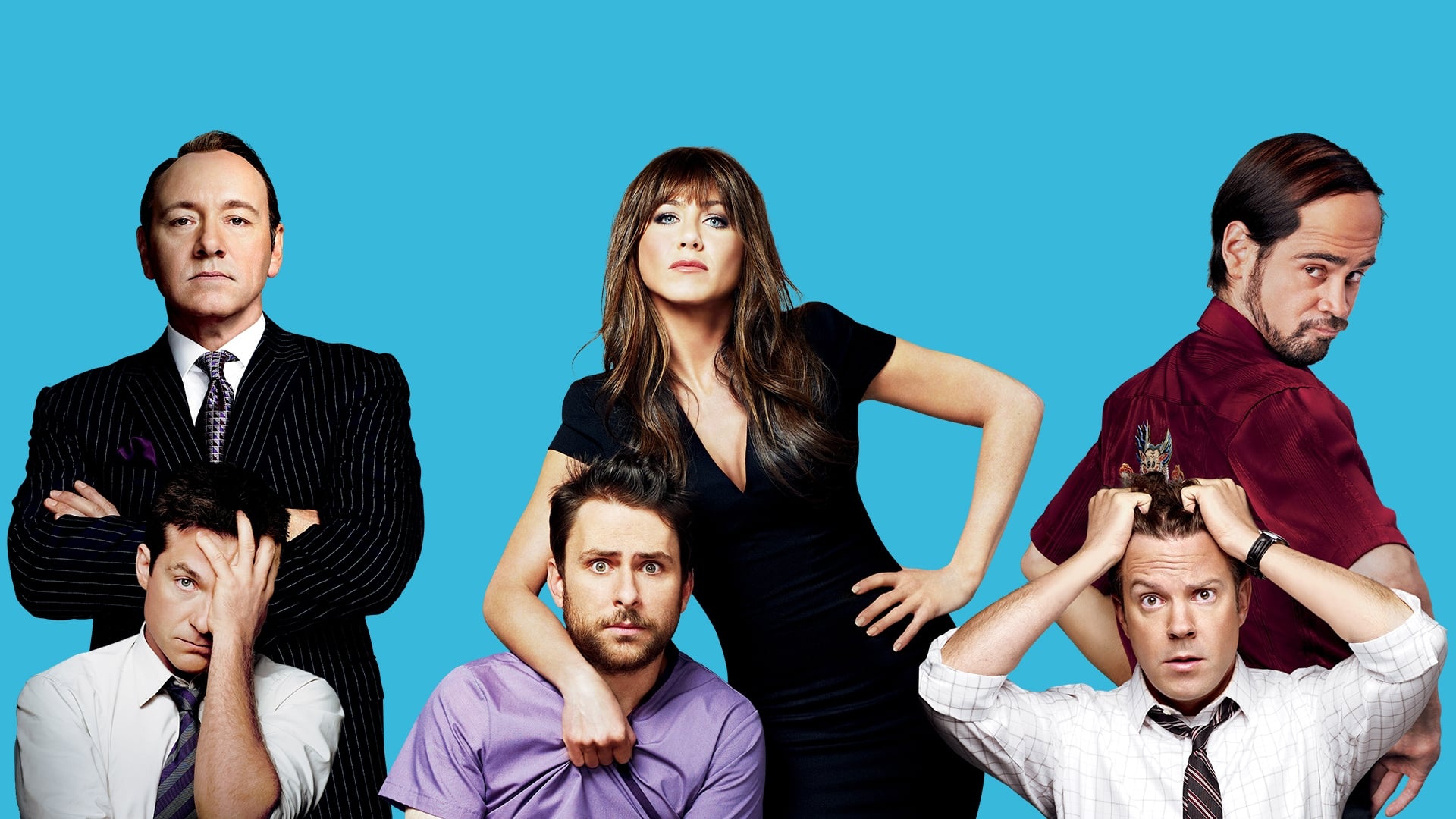
Thematic Elements and Performance
The film tackles themes of workplace harassment and the extremes to which desperate employees might go to rid themselves of tyrannical bosses. Aniston’s role as the antagonist was a departure from her usual characters, providing her with an opportunity to explore a more unapologetically villainous persona. Critics and audiences alike praised her for her bold performance, highlighting her ability to break away from her typical roles.

Cultural Impact and Critical Reception
“Horrible Bosses” was a commercial success, appreciated for its humor and the strong performances of its cast. Aniston’s role challenged societal expectations of her as an actress, proving her comedic prowess and willingness to take risks. The film added a new dimension to her career, showcasing her flexibility and talent in comedy.
Comparison and Evolution
This role was a significant shift from the emotional depth of “Cake” or the heartfelt narrative of “Marley & Me,” emphasizing Aniston’s comedic abilities and her fearless approach to diverse roles. It highlighted her evolution as an actress unafraid to step outside her comfort zone and tackle unconventional characters.
5. Office Space (1999)
Plot and Character Development
Before “The Good Girl” marked a turning point in her career, Jennifer Aniston starred in “Office Space,” a cult classic that satirizes the mundanity of the corporate world. Aniston plays Joanna, a waitress frustrated with her job and the absurdities of the service industry. Her character’s relatable plight and disdain for arbitrary rules, such as the infamous flair requirement, resonated with viewers who have experienced the drudgery of uninspiring jobs.
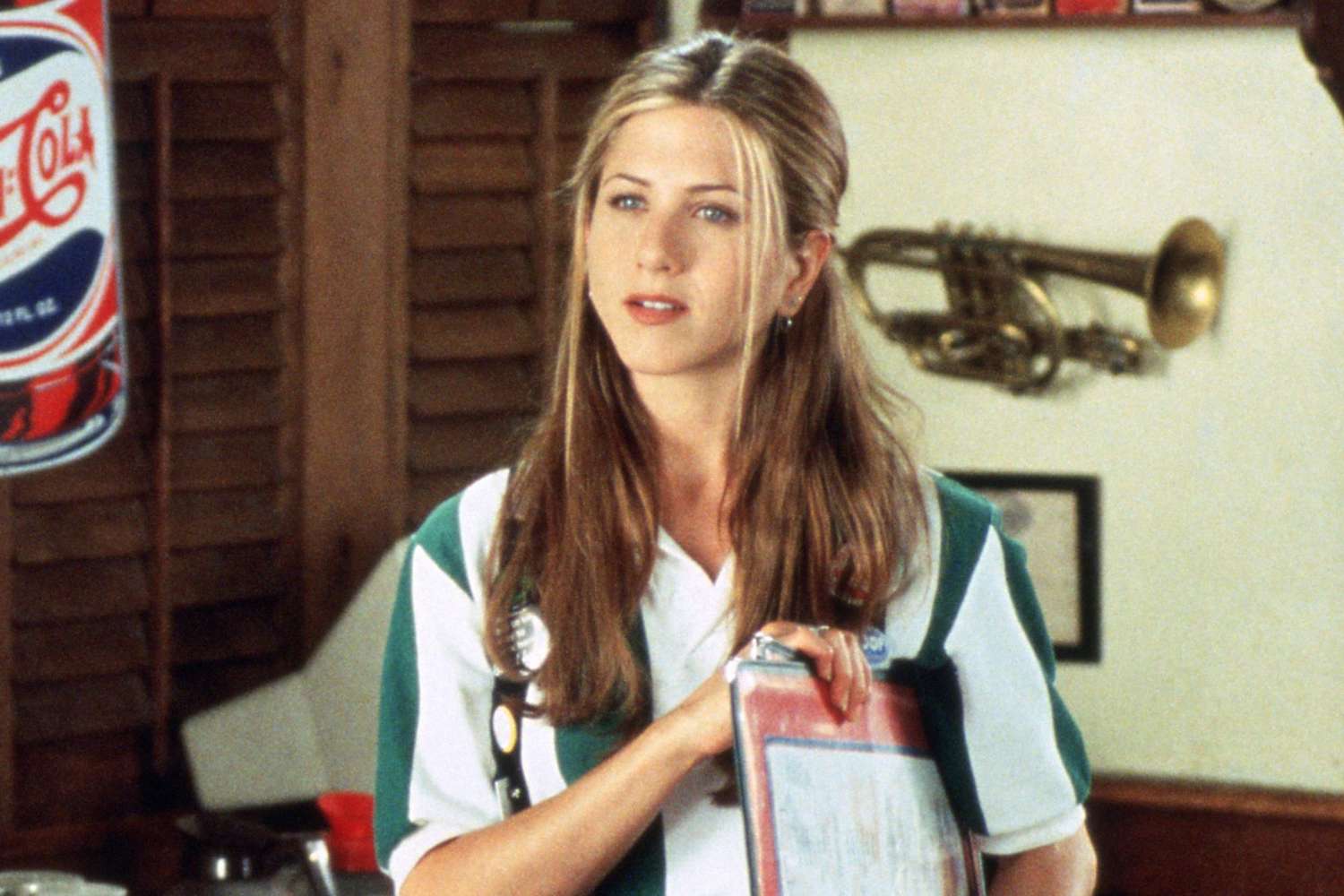
Thematic Elements and Performance
“Office Space” explores themes of workplace dissatisfaction, the quest for personal fulfillment, and the absurdity of corporate culture. Aniston’s portrayal of Joanna provided a humorous yet insightful commentary on the expectations placed on employees in the service industry. Her performance was noted for its authenticity and comedic timing, contributing significantly to the film’s enduring popularity.
Cultural Impact and Critical Reception
Although not an immediate box office success, “Office Space” has since gained a cult following, with Aniston’s role being pivotal in highlighting the film’s comedic and thematic elements. The movie’s critique of corporate life and its impact on individuality has made it a beloved classic, with Aniston’s performance earning praise for its contribution to the film’s lasting appeal.
Comparison and Evolution
Comparing “Office Space” to her roles in “Cake” and “The Good Girl,” we observe Aniston’s versatility in moving between comedy and drama. This early role showcased her comedic talents and set the stage for her subsequent success in both film and television, demonstrating her ability to resonate with audiences across a variety of genres.

6. The Break-Up (2006)
Plot and Character Development
“The Break-Up” offers a realistic and often uncomfortable look at the disintegration of a relationship, with Aniston playing Brooke Meyers, who navigates the complexities of love, compatibility, and letting go. The film strikes a balance between comedy and drama, allowing Aniston to showcase her ability to handle both with ease.
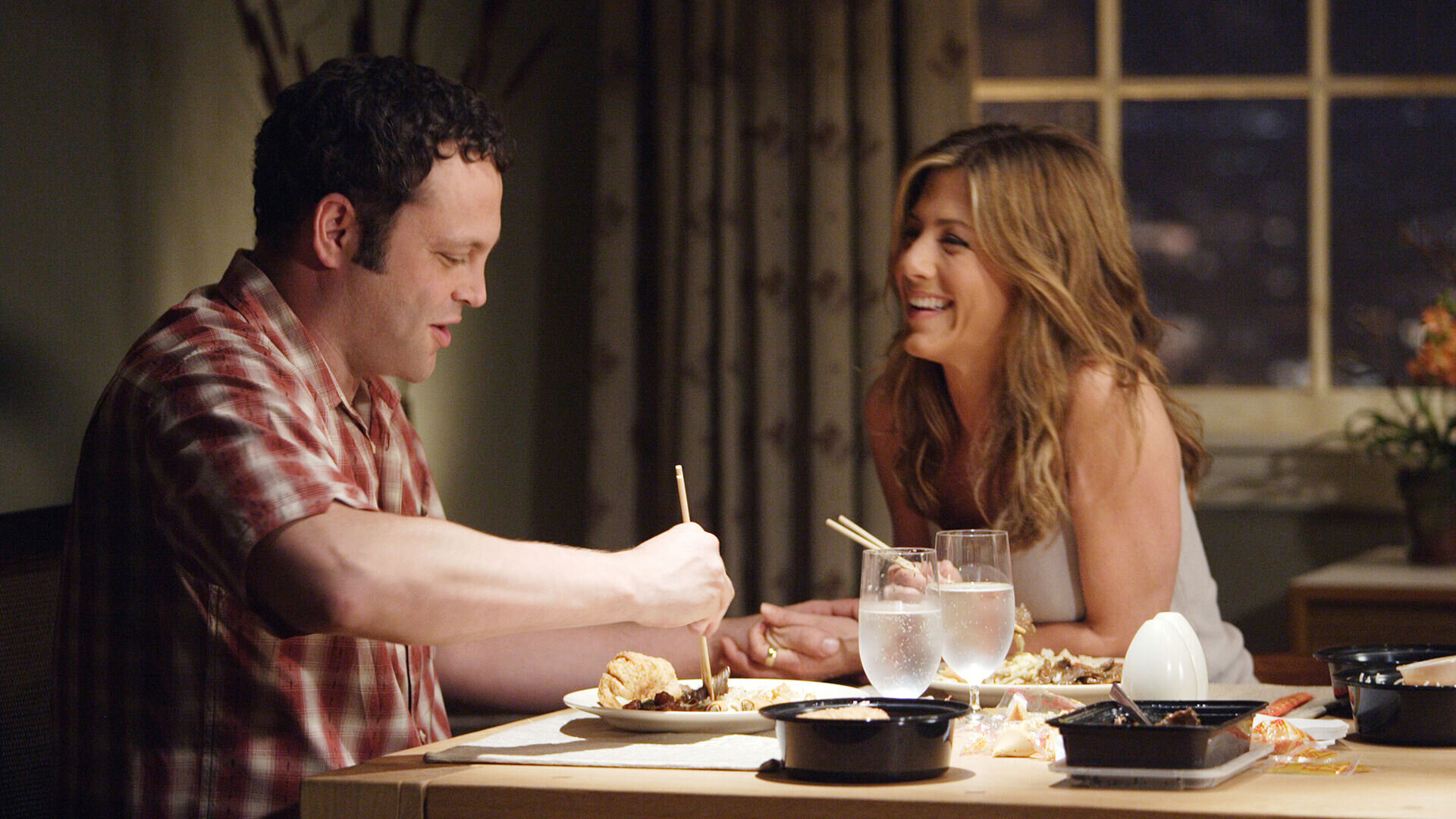
Thematic Elements and Performance
Addressing themes of communication, love, and the challenges of cohabitation, “The Break-Up” explores the dynamics of a relationship on the brink of collapse. Aniston’s performance was praised for its depth and realism, capturing the emotional turmoil and vulnerability of her character with nuance and sensitivity.
Cultural Impact and Critical Reception
The film resonated with audiences for its honest portrayal of a breakup, avoiding the clichés of romantic comedies to focus on the more difficult aspects of relationships. Aniston’s role was integral to the film’s success, providing a relatable and heartfelt performance that further established her as a versatile actress capable of conveying complex emotions.

Comparison and Evolution
In comparison to “Horrible Bosses,” “The Break-Up” showcases a different aspect of Aniston’s talent, focusing on the emotional depth and realism she can bring to a character. This role underscores her evolution as an actress adept at navigating both the comedic and dramatic spectrums of her craft.
7. Along Came Polly (2004)
Plot and Character Development
“Along Came Polly” is a romantic comedy that showcases Aniston as Polly Prince, an eccentric and free-spirited woman who becomes the love interest of a risk-averse insurance analyst played by Ben Stiller. This role highlights Aniston’s ability to embody characters who are both relatable and uniquely charismatic, bringing a sense of authenticity and vibrancy to the screen.
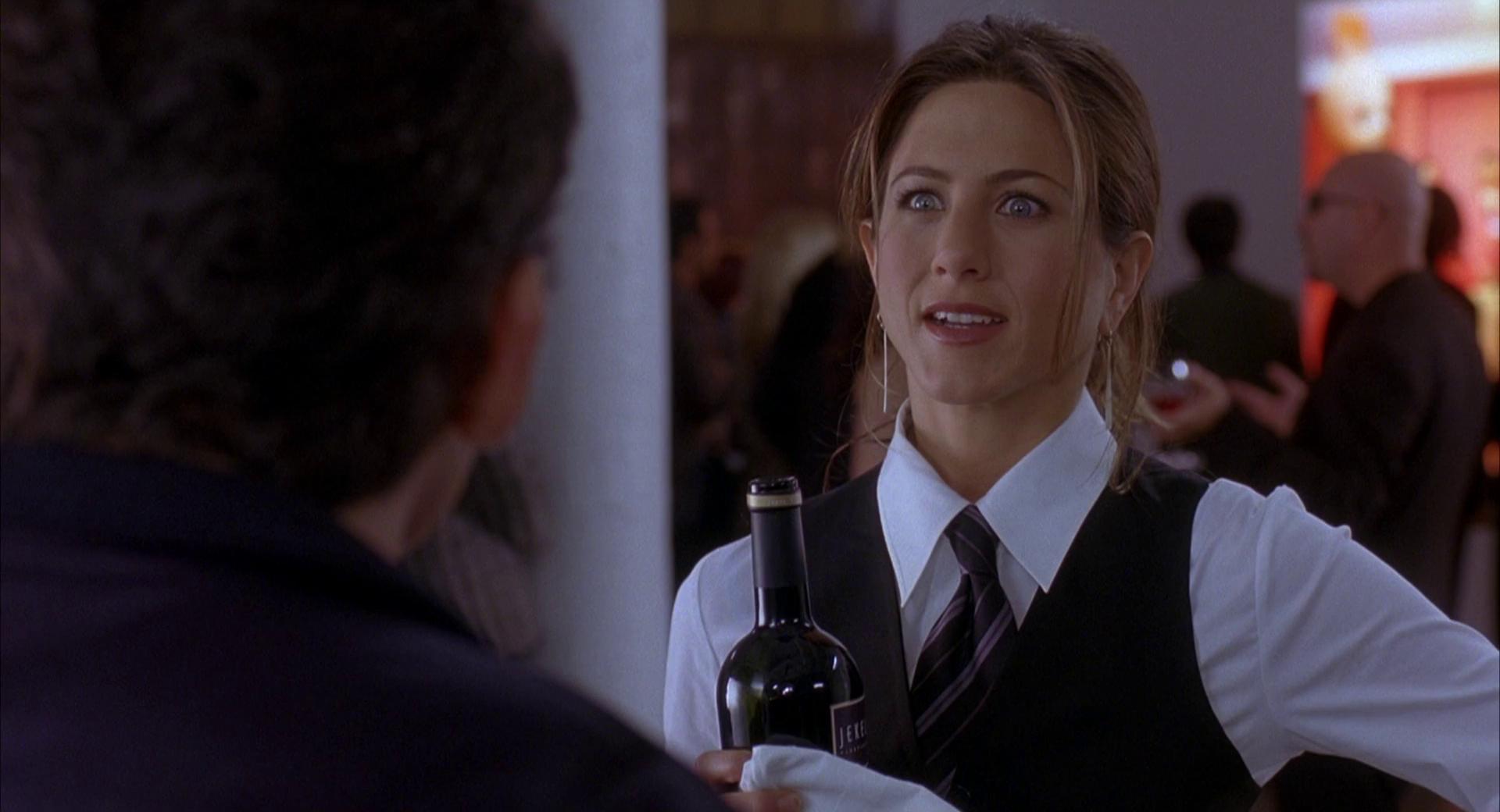
Thematic Elements and Performance
The film explores themes of love, risk-taking, and the importance of stepping out of one’s comfort zone. Aniston’s portrayal of Polly offers a refreshing take on the romantic comedy heroine, combining humor with depth and proving her prowess in creating compelling, multifaceted characters.
Cultural Impact and Critical Reception
“Along Came Polly” enjoyed commercial success and further established Aniston as a leading actress in romantic comedies. Her chemistry with Stiller and her performance was praised, cementing her status as a go-to actress for roles that require both comedic and dramatic talents.

Comparison and Evolution
Compared to her more dramatic roles in films like “Cake” and “The Good Girl,” “Along Came Polly” allowed Aniston to return to her comedic roots while still showcasing her ability to bring depth to a lighter role. It exemplifies her versatility and her skill in balancing humor with genuine emotional resonance.
8. The Morning Show (2019 – Present)
Plot and Character Development
While not a movie, “The Morning Show” merits inclusion due to its significant impact on Aniston’s career and its reflection of her versatility as an actress. In this critically acclaimed series, Aniston plays Alex Levy, a morning TV show host navigating the complexities of the media industry amid scandal and competition. This role demonstrates Aniston’s capacity for portraying strong, complex women facing both personal and professional challenges.
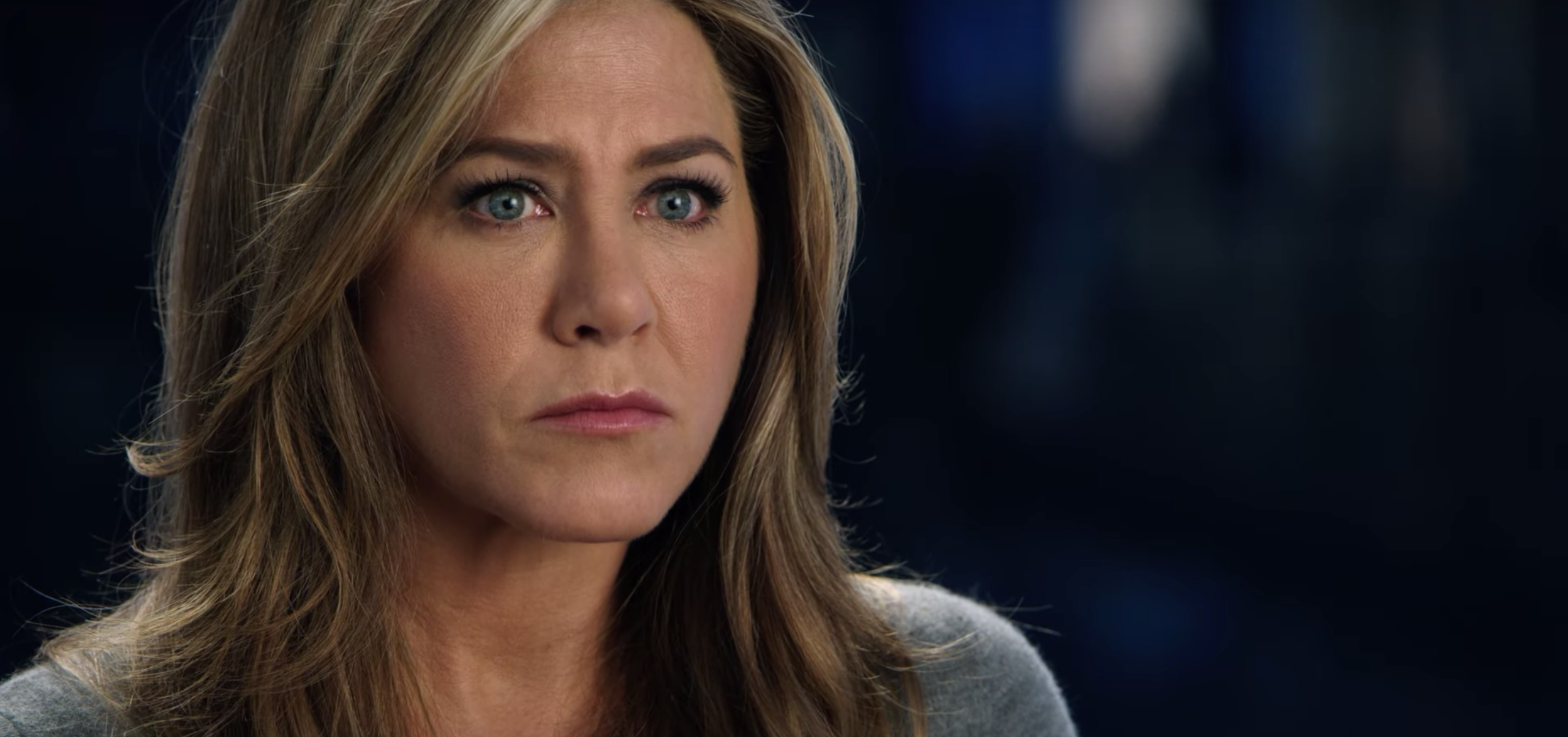
Thematic Elements and Performance
The series tackles themes of power, media ethics, and the #MeToo movement, with Aniston’s performance earning widespread acclaim for its depth, nuance, and intensity. Her portrayal of Alex Levy has been highlighted as a career-defining role, showcasing her dramatic chops and ability to carry a series with both critical and commercial success.
Cultural Impact and Critical Reception
“The Morning Show” has been praised for its timely and thought-provoking content, with Aniston’s performance earning her several awards and nominations. The show has sparked discussions about workplace dynamics, gender politics, and the role of news media in shaping public opinion, underscoring Aniston’s influence in projects that resonate with contemporary issues.
Comparison and Evolution
This role marks a significant evolution in Aniston’s career, moving from film to a leading role in a prestigious television series. It showcases her growth as an actress capable of tackling complex issues and characters, further solidifying her place in the entertainment industry.

9. Dumplin’ (2018)
Plot and Character Development
In “Dumplin’,” Aniston plays Rosie Dickson, a former beauty queen who now runs the local pageant in a small Texas town. Her relationship with her plus-sized daughter, who decides to enter the pageant in protest, serves as the film’s emotional core. Aniston’s role as Rosie explores themes of motherhood, self-acceptance, and the critique of beauty standards.
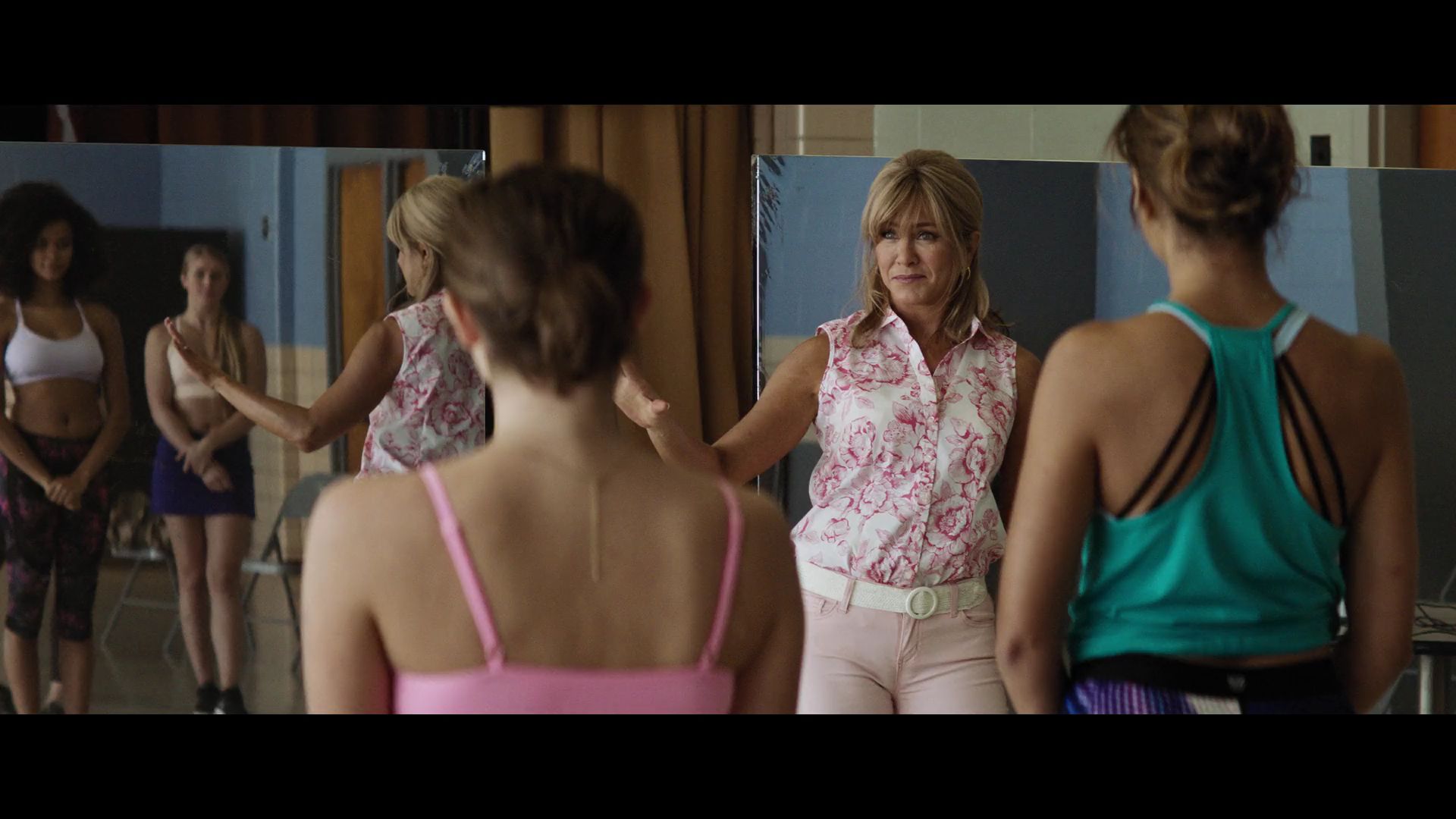
Thematic Elements and Performance
Aniston’s performance was praised for its warmth, complexity, and nuanced portrayal of a mother grappling with her insecurities and the desire to support her daughter. “Dumplin'” addresses the importance of body positivity and the value of challenging societal norms, making it a meaningful project in Aniston’s filmography.

Cultural Impact and Critical Reception
The film received positive reviews for its heartwarming message and strong performances, particularly Aniston’s, which added depth to what could have been a stereotypical role. “Dumplin'” resonated with audiences for its empowering message and was celebrated for promoting diversity and acceptance.
Comparison and Evolution
“Dumplin'” highlights Aniston’s ability to select roles that contribute to important conversations, showcasing her growth as an actress who seeks out projects with substance and emotional depth. It reflects her commitment to challenging traditional narratives and supporting inclusive storytelling.
10. Friends With Money (2006)
Plot and Character Development
“Friends With Money” is a dramedy that follows the lives of four women, with Aniston playing Olivia, a woman struggling with her career and personal life amidst her wealthier friends. This role allowed Aniston to explore a character dealing with existential and material dissatisfaction, showcasing her ability to convey vulnerability and resilience.
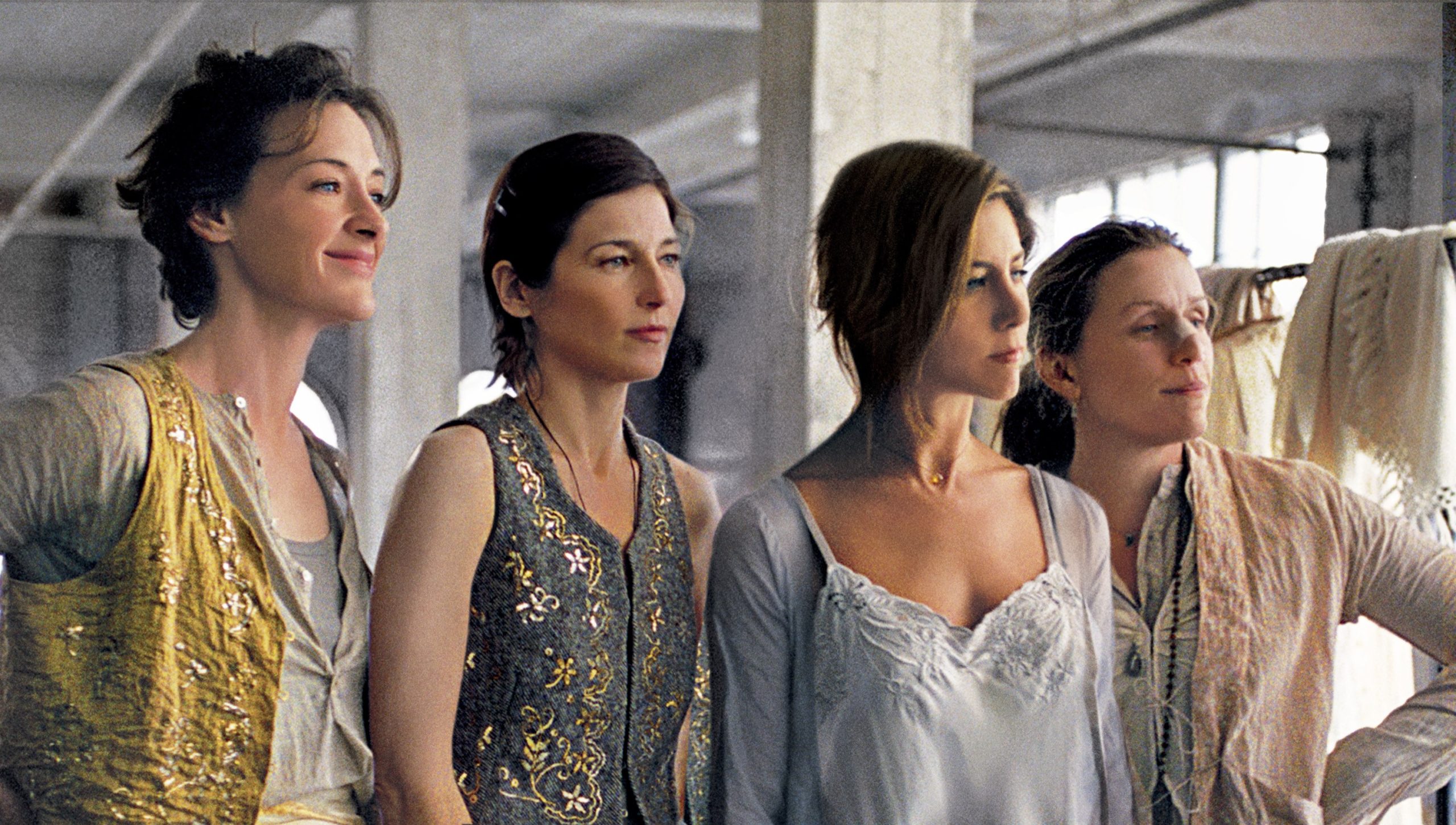
Thematic Elements and Performance
The film addresses themes of friendship, socio-economic differences, and the search for happiness, offering a candid look at the complexities of adult relationships. Aniston’s portrayal of Olivia was lauded for its authenticity and depth, capturing the subtle nuances of a woman trying to find her place in the world.
Cultural Impact and Critical Reception
“Friends With Money” was well-received by critics, who praised the film for its insightful examination of friendship and financial disparity. Aniston’s performance stood out, with many noting her skill in bringing relatable, nuanced characters to life.

Comparison and Evolution
This film reflects Aniston’s continued evolution as an actress willing to delve into the intricacies of human relationships and societal issues. Her role in “Friends With Money” further demonstrates her range and commitment to roles that resonate on a personal and social level.
Jennifer Aniston’s remarkable journey through Hollywood is a testament to her unparalleled talent, versatility, and dedication to her craft. From her breakout role in “Friends” to her diverse filmography that spans genres and themes, Aniston has proven to be a dynamic and influential figure in the entertainment industry.
Her ability to seamlessly transition between roles, from the comedic brilliance of “Horrible Bosses” to the emotional depth of “Cake,” showcases a range that few actors possess.
Aniston has not only entertained millions around the globe but has also brought attention to nuanced human experiences, societal issues, and the complexities of life through her performances.
Jennifer Aniston’s legacy in Hollywood is characterized by her commitment to challenging traditional narratives, pushing boundaries, and selecting roles that offer both depth and entertainment.
Through her work, she has influenced emerging actors, inspired audiences, and contributed significantly to the cultural landscape. Her roles in the top 10 movies discussed reflect not only her growth as an actress but also the evolution of cinema itself, embracing stories that are diverse, impactful, and resonant.
As we reflect on Jennifer Aniston’s impact on contemporary cinema, it is clear that her influence extends beyond her filmography. She has become a symbol of resilience, authenticity, and the pursuit of artistic excellence.
Aniston’s legacy is not just in the characters she has brought to life on screen but in her ability to connect with audiences personally, making her one of the most beloved and respected figures in Hollywood.
Jennifer Aniston’s journey reminds us of the power of storytelling and the importance of cinema as a medium for exploring the human condition. Her contributions to the industry serve as a blueprint for future generations of actors, encouraging them to pursue their craft with passion, integrity, and a commitment to storytelling that moves and inspires. As we look forward to her future projects, it is evident that Jennifer Aniston’s influence on Hollywood and contemporary cinema will continue to be felt for years to come.









